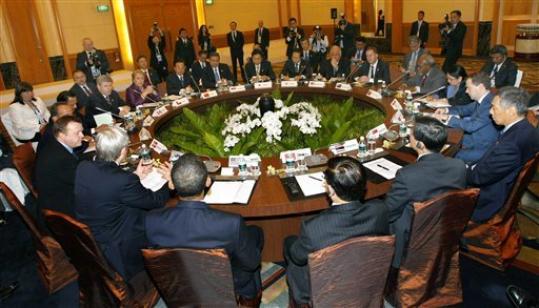The stage has been set for declaring victory on the Bogor goal in 2010 and moving on. The speech to CEOs by the host of APEC, Prime Minister Lee Hsien Loong, noted that average tariff have been reduced from close to 20, down to 5 per cent. He then explained that:
While tariffs may look low, the real problems which businessmen face may be far from negligible. So much work remains: to harmonize trade rules, to remove non-tariff barriers, to simplify customs regulations, to help companies realize more fully the benefits of free trade, and to help populations benefit more fully from free trade.
The remaining task of deeper economic integration is a challenge that will be delivered only over the long haul, but the APEC leadership have now committed themselves to practical, measurable progress.
The modest target of second phase of the Trade Facilitation Action Plan (TFAP II) to reduce transaction costs by a further 5 per cent will now be complemented by more ambitious, but achievable targets to reduce business costs. The costs of starting a business, getting credit, enforcing contracts, trading across borders, and dealing with permits are to be reduced by 25 per cent by 2015. APEC ministers pointed out this program, if successful could:
reduce on average the cost of importing and exporting a container of goods by up to US$450; reduce on average the time taken to start a business by one week; and remove on average five procedures to obtain a construction permit.
Meeting these targets is largely a matter behind-the-border policy reform which fits well with the growing emphasis on structural adjustment. The importance of capacity-building, based on sharing information, experience expertise and technology, is now well accepted. APEC leaders declared that:
We will leverage APEC’s traditional strengths of voluntary cooperation, capacity building, sharing of best practices, and working with the private sector, to implement necessary reforms in infrastructure development, agriculture/food management, social security, education and workforce training, and regulatory frameworks. We will work with the International Financial Institutions and Multilateral Development Banks to facilitate these efforts.
In 2009 there was welcome attention to practical ways to enhance the efficiency and security of supply chains which are becoming increasingly important to international commerce. Work on ‘connectivity’ includes efforts to eliminate logistic bottlenecks and promoting region-wide access not only to the internet, but to broadband. Performance indicators will be used to assess supply chains.
Finance Ministers expect to involve multilateral development banks to help upgrade infrastructure, and encouraging Asia Pacific governments to adopt:
sustainable and viable financing policies, and supporting technical assistance, capacity-building and knowledge-sharing initiatives to make infrastructure markets operate more effectively.
Multilateral development banks are also to:
conduct studies and provide recommendations to help facilitate, catalyse and channel private sector financing into these sectors.
The APEC week saw the APEC process positioned not in isolation, but as part of parallel efforts of several institutions and forums to address global as well as regional concerns. The heads of the WTO, IMF, World Bank and the ADB attended and contributed to ministerial meetings.
Speeches by leaders considered emerging new forums such as the G20 and the East Asia Summit and how to preserve the security environment needed to sustain the economic success of the Asia Pacific since 1989.
Australian Prime Minister Rudd spelt out his vision of an Asia Pacific Community. He considered it essential that the Asia Pacific devise arrangements to prevent any prospect of conflicts generated by unresolved issues, such as territorial claims. He said that Europe has succeeded in doing so, while emphasising the need to do things very differently in this part of the world.
In the Asia Pacific, a more appropriate model is that of ASEAN. That association of diverse members has shown the effectiveness of 40 years of patient consensus-building, forging a sense of community through a habit of cooperation to deal with issues through voluntary cooperation leading to mutual respect and mutual benefit.
Mr. Rudd expressed the economic vision for an Asia Pacific Community as a single market. Like free and open trade, it is a vision which can only be approached, rather than reached by any deadline.
At the same time, a single market is a much more useful point of reference for ever-deeper economic integration at this time. It can lead to a decisive break from past preoccupation with residual border barriers which, while costly, affect a rapidly shrinking part of international commerce.
The challenge is to find ways to approach a single market in coming years, based on the approach of ASEAN, not of the EU. A useful way to begin would be for APEC working groups to help ASEAN move towards its goal of an economic community, while encouraging ASEAN to be pathfinders, adopting practical cooperative arrangements for deeper economic integration which others can join when they are able to do so.

